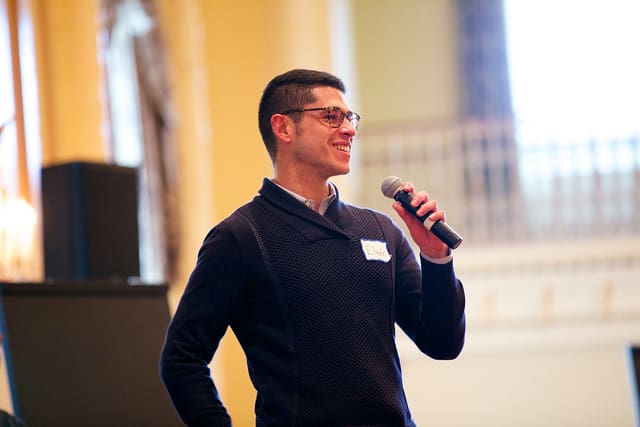How can evaluators use the "story of self" as a tool to advance equity in their practice?
A couple of months ago, FSG hosted its annual firm retreat in Seattle. During the event, Andy Goodman, an expert in the power of storytelling, conducted a great session on storytelling for social impact. In his presentation, Andy offered compelling examples of the power of storytelling as a tool in the social sector. This included an interesting exercise in developing a “story of self”: a short narrative of who you are, where you come from, and why you do what you do. The “story of self” is one of the elements of effective public speaking developed by Professor Marshall Ganz. The “story of self” has been used effectively by leaders and community organizers (e.g. Cesar Chavez) for decades to establish firm ground with their constituencies, find common purpose, and move others to action.
As we went through the “story of self” exercise, I realized how powerful this tool can be for evaluators who want to advance equity in the social sector. Given this year’s American Evaluation Association conference theme—Visionary Evaluation for a Sustainable, Equitable Future—I started reflecting on how evaluators can use the “story of self” to advance equity in their practice. Based on my experience, I came up with three potential uses:
1. Understand who you are and the perspectives you bring to your evaluation practice
Developing a “story of self” can help evaluators understand the lens through which they see the world and others view them. We all bring different perspectives to our work, and understanding those perspectives is important to being a culturally competent evaluator. Working on my “story of self” helped me develop a high degree of self-awareness to understand how my background and lived experiences enhance or limit my ability to conduct an evaluation. This self-awareness has positively affected the way I approach my work with the Latino community. I’m an immigrant from Mexico and I’m familiar with the situation of other Mexican immigrants. Still, I recognize that I didn’t grow up in this country, and the experiences of those Latinos who did are different from mine—I need to learn from them. I might be gay but, as a cisgender male, I have a lot to learn from the experiences of other members of the LGBTQ community that are different from me. Developing a “story of self” can help evaluators be self-aware of how gender, race, ethnicity, sexual orientation, socioeconomic status, and other personal characteristics affect the way they see the world, the way they are perceived by others, and the way they approach their work.
2. Strengthen interpersonal connections and develop a sense of common mission in your team or organization
Sharing the “story of self” with co-workers or team members can strengthen interpersonal connections and develop a deeper sense of common mission among group members. During the storytelling training with Andy Goodman, I realized that personal appearance can only take you so far in understanding your colleagues’ background, experiences, and passions. I heard stories of many of my colleagues at the training, and I discovered many things about them. After listening to the stories, I was inspired. I felt an increased sense of empathy and common purpose with my colleagues. It was very clear at the end of the exercise that at FSG, we are all passionate about reimagining social change and helping our clients find better ways to solve social problems. Listening to other stories of self can create empathy and stronger relationships among evaluation partners, and establish a sense of common mission.
3. Develop trust with clients and communities to improve the quality of your data
Sharing relevant parts of the “story of self” can increase the level of trust between evaluators, their clients, and the communities where they work. Higher levels of trust increase the quality of your data collection because people are more likely to share information if they can trust and relate to you. Often as evaluators, we talk to our clients about what we can do for them but we don’t talk about our own experiences. We engage in focus groups and interviews in communities asking lots of questions, but we don’t share much about ourselves. We often miss an opportunity to create interpersonal connections and develop trust in a way that doesn’t compromise the quality of the data collection and analysis process. I have been part of the evaluation team for the Lumina Latino Student Success effort for almost 2 years. From the very beginning of the engagement, I have been very vocal with program officers and grantees about my personal interest in the program’s mission. I talk about my cousins Keabeth and Imanol, and how I want to see them graduate from college, so the mission is personal. Program officers and grantees trust my neutrality as an evaluator, my understanding of the Latino community, and my full commitment to the effort which has resulted in open and candid interviews and focus groups. Evaluators can benefit from sharing part of their “story of self” to increase trust with clients, relate to interviewees or focus group participants, and increase the quality of their data collection.
The “story of self” can help evaluators turn values into action. Evaluators are much better equipped to advance equity in their practice when they fully understand how they are perceived and the perspectives they bring, develop deeper interpersonal connections with their teams, and increase trust from clients and communities. By developing and sharing the “story of self”, evaluators can better understand their prejudices and reduce potential personal bias, increase the team’s cultural competency, and make their evaluation practice more equitable and inclusive.
The “story of self” is just one storytelling tool evaluators can use to increase equity in our practice. Have you found any other tools for advancing equity in your evaluation practice? Share your story below!

